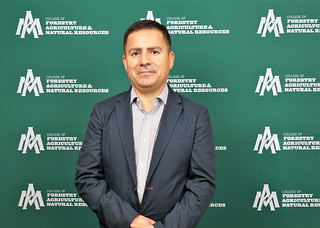New UAM forestry faculty member Yáñez seeks to develop research related to climate extremes
"I came to Arkansas, the Natural State, for opportunity." — Marco Yáñez
Sept. 15, 2023
By Lon Tegels
U of A System Division of Agriculture
Fast facts:
- UAM's College of Forestry, Agriculture, and Natural Resources continues to grow
- New silviculture professor interested in climate research
- Yáñez joins UAM Forestry instruction, research teams
(525 words)
(Newsrooms: with art of Yáñez)
MONTICELLO, Ark. — Marco Yáñez, assistant professor of silviculture and forest ecology for the University of Arkansas at Monticello, has a keen interest in climate effects.
Yáñez, who hails from Chile, joined the faculty on Aug. 1 and will begin teaching in January. He conducts research at UAM for the University of Arkansas System Division of Agriculture’s Arkansas Agricultural Experiment Station and teaches classes through the University of Arkansas at Monticello’s College of Forestry, Agriculture and Natural Resources. Together, the division and the college co-host the Arkansas Forest Resources Center.
He has a forest engineering degree from Chile's University of Talca and a Ph.D. from Virginia Tech University. As part of a scholarship agreement with the Chilean government, Yáñez returned to his home country to put his forestry degrees to work. There, Yáñez served as a research scientist at the University of Concepción, the University of Talca and the University of Chile.
At the University of Talca, he has taught various courses in forestry, including fundamentals of quantitative genetics, forest measuration, plantation silviculture and forest ecophysiology. He has been involved in research related to forest health, genetic selection, plantation silviculture and ecological restoration in Mediterranean-type climate zones. Yáñez said he plans to focus his forestry research on the effects of climate extremes, something he’s seen in his home country.
Formerly an avid bird hunter and angler, Yáñez said that in Chile, “drought and anthropogenic pressure over the natural resources in the last decades have considerably decreased the fish population and wild game birds.
He said the scenario in Chile changed drastically, with restrictions on hunting and fishing.
“Many species that were abundant are no longer so,” he said.
"We talk about a megadrought," he said. "Since 2010, we have had several environmental issues related to this climate in Chile. We used to vacation at beautiful lakes, but now some of them have all dried up."
Yáñez said he has a variety of interests, including traveling, outdoor activities, reading, and tennis. Soccer is a passion for Yáñez, and he has transitioned from an active player to a dedicated spectator.
Yáñez said he is excited to join the College of Forestry Agriculture and Natural Resources.
"I came to Arkansas, the Natural State, for opportunity. A little more than half of the state is covered with forest. Forestry is an essential part of the state's economy. UAM is the only school of forestry in the entire state, and silviculture is a key science in forestry education," he said.
Mike Blazier, dean of the College of Forestry, Agriculture and Natural Resources at UA-Monticello, said Yáñez’s experience and knowledge are an excellent fit.
“We’re excited to have Dr. Yanez as part of our faculty,” Blazier said. “With his expertise in silviculture and ecophysiology and experience in forest plantation and forest restoration research in the United States and Chile, he fits right into ongoing research initiatives of the Arkansas Forest Resources Center and will be a vital leader and collaborator on a lot of projects.
“Our students will benefit greatly from how he can integrate his silviculture and ecology research into his teaching,” he said.
About the College of Forestry, Agriculture and Natural Resources and the Arkansas Forest Resources Center
The College of Forestry, Agriculture and Natural Resources, and the Arkansas Forest Resources Center, a University of Arkansas System Center of Excellence, brings together interdisciplinary expertise through a partnership between the University of Arkansas at Monticello and the University of Arkansas System Division of Agriculture. The College and Center are headquartered at the University of Arkansas at Monticello campus, but their programs range statewide with the mission of developing and delivering teaching, research, and extension programs that enhance and ensure the sustainability and productivity of forest-based natural resources and agricultural systems. Academic programs are delivered by the College of Forestry, Agriculture, and Natural Resources through the University of Arkansas at Monticello. Through the University of Arkansas System Division of Agriculture, research is administered by the Arkansas Agricultural Experiment Station, and extension and outreach activities are coordinated by the Arkansas Cooperative Extension Service.
The University of Arkansas at Monticello and the University of Arkansas System Division of Agriculture offer all of their programs and services (including employment) without regard to race, color, sex, national origin, religion, age, disability, marital or veteran status, genetic information, sexual preference, pregnancy or any other legally protected status, and are equal opportunity institutions.
About the Division of Agriculture
The University of Arkansas System Division of Agriculture's mission is to strengthen agriculture, communities, and families by connecting trusted research to the adoption of best practices. Through the Agricultural Experiment Station and the Cooperative Extension Service, the Division of Agriculture conducts research and extension work within the nation's historic land grant education system.
The Division of Agriculture is one of twenty entities within the University of Arkansas System. It has offices in all seventy-five counties in Arkansas and faculty on five system campuses.
Pursuant to 7 CFR § 15.3, the University of Arkansas System Division of Agriculture offers all its Extension and Research programs and services (including employment) without regard to race, color, sex, national origin, religion, age, disability, marital or veteran status, genetic information, sexual preference, pregnancy or any other legally protected status, and is an equal opportunity institution.
# # #
Media contact: Lon Tegels
tegels@uamont.edu
870-460-1852
@UAM_CFANR
